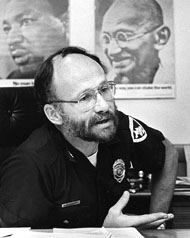“The difference between you and me, David, is that your opponents come after you on a daily basis, my opponents go after me every four years at election time” — Former Dane County Sheriff Bill Ferris.
 Years ago, I remember the late Dane County Sheriff and close friend of mine, Bill Ferris, saying to me as I was battling yet another challenge during my early days as a police chief, “The difference between you and me is that your opponents come after you on a daily basis, my opponents go after me every four years at election time.”
Years ago, I remember the late Dane County Sheriff and close friend of mine, Bill Ferris, saying to me as I was battling yet another challenge during my early days as a police chief, “The difference between you and me is that your opponents come after you on a daily basis, my opponents go after me every four years at election time.”
I haven’t thought much about electing police chiefs until recently. In fact, if you’d queried me on the subject prior to Ferguson, I would have been adamantly opposed to the idea. Now the Milwaukee city council (with opposition by the mayor) is calling the question by proposing the chief of police in their city be an elected office. Will this be the ultimate growth of true Community-Oriented Policing? I mean, won’t the election of a police chief involve the community more in how they want their police to be led? Is this our future?
Watching police chiefs over the years and having been one for a quarter of a century in two cities, I am reconsidering my position on this matter. I am doing so because some of the most dramatic changes I have seen since Ferguson have been accomplished by elected sheriffs. (Notably: Scott Thomson in Camden, NJ.)
Having said this, I can also identify sheriffs around the county who represent what I would call the worst of policing (think Joe Arpaio). But then again I reassure myself that communities do get the kind of police they deserve or are unwilling to engage.
I am not suggesting that the problems I see in policing today (how and when physical force is used, resisting openness and accountability, the implementation of city-wide neighborhood policing, the practice of Procedural Justice organizationally and in the community, and the visible and factual improvement of community trust) might just be better accomplished by chief executives who are strongly committed and highly accountable to the community/communities they serve. Electing the chief of police would, as they say, put more “skin into the game.”
My sense also is that electing police chiefs would put a strong interest in a candidate who is able and accountable to serving everyone in the community and not what often appears today.
I say this because the mayor-police chief relationship is often one that is peppered with local politics that sometimes go far beyond what the police executive feels is the proper way to proceed. I could even argue that in most major cities today (where the mayor appoints the chief of police) there exits a de facto political relationship that waters down police accountability to those who are most likely to have contact with police.
In the U.K., they recently restructured their system of policing and established elected police commissioners to oversee chief constables (chiefs of police). The system has been in operation for a number of years now and seemingly did not result in the catastrophe predicted by many chief constables.
Yet I know that if we really want lasting change and continuous improvement within the ranks of our police it is going to take a leader who has time to do this outside of partisan politics and has at least a seven-year term to implement needed changes. Without that, you can simply kiss police reform goodbye!
So, what I am suggesting is that we strongly consider police chief elections as a local option — such as what some council members in Milwaukee are proposing — and see how it works. If it works well, other cities may consider this option. If it doesn’t, well, we most likely won’t have lost much.


I can see the Koch brothers pouring money into the election of police chiefs thanks to the Supreme Court ruling that money is free speech and that corporations are people.
LikeLike
But if we maintained a free society? A proper warning…
LikeLike